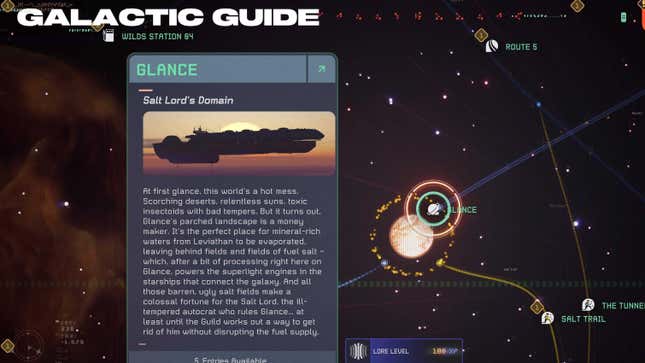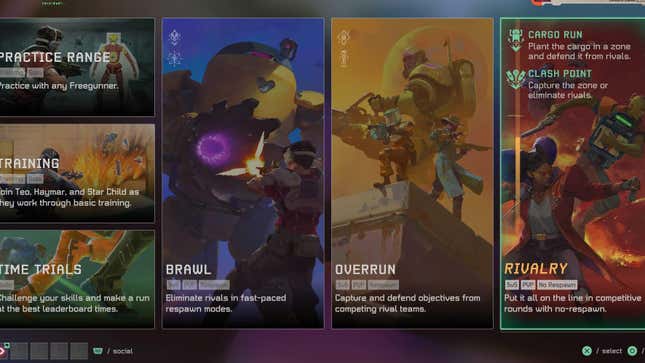Concord is a hero-based multiplayer shooter where you run around sci-fi maps on distant planets using pistols, cannons, fireballs and knives to obliterate opponents in familiar modes like “capture the point” and “kill stuff.” There’s nothing in it that’s surprised me or blown my mind, but it’s pretty and, more importantly, fun. That’s the worst part.
Concord has so much going against it—bad vibes, a cacophonous presentation, and a broad sense of apathy I have not seen for a first-party PlayStation game in a decade—but it’s clear a lot of love, care, and attention went into every aspect of the live-service shooter, even if not all, or even most of them, really feel like they pay off yet. The game is not bad! So why am I so hesitant to call it good?
I’ve played for about 5-7 hours during the early access period this week ahead of Concord’s August 23 launch, and, as was the case during the beta, the moment-to-moment gameplay is solid and I’ve really enjoyed experimenting with the unique weapons, abilities, and movement style of its starting roster of 16 “Freegunners.” It feels like going to a new restaurant and enjoying a novel menu full of experimental dishes and new twists on old classics. But would I really want to eat here every day or even once a week?

The news that developers at Firewalk Studios, which Sony only acquired last year, had been working on Concord in some form for up to eight years, has been yikes-inducing for some, but nothing about the game looks cheap or unconsidered, from its detailed character models and elaborate custom cosmetic kits to its elegant interface and bespoke text fonts. I love that you navigate menus directly rather than via a floaty on-screen cursor, and in-game vignettes, animated shorts, and a sprawling lore map point to a lot of deep and imaginative worldbuilding.
Judged in a vacuum, it wouldn’t be hard to recommend Concord, especially a decade ago when we were not swimming in online multiplayer shooters, especially colorful ones not called Call of Duty or Battlefield. Unfortunately it’s 2024, and a live-service game doesn’t offer a discrete experience so much as it demands an ongoing relationship and dedicated investment, and there are a lot of time sinks out there competing for people’s precious and dwindling minutes on this earth. And there’s just not a lot of things pulling me back to Concord right now, and lots that are actively dragging it down.
Matches are short, with most lasting around five minutes or so. This can be nice for hopping in quickly, getting a taste of the action, scoring some cool kills and racking up a few objectives, and then not getting bogged down in the casual matchmaking chaos when one team is blowing the other out of the water. Occasionally it feels like matches get cut off at the legs right when they’re starting to get interesting. It takes a few rounds to get a feel for the strangers on your team and your opponents on the other side, with mini-dramas and revenge stories flickering in and out of existence as the match unfolds.
There’s a lot of strategy when it comes to planning matchups, changing team composition, and accruing bonuses from getting more and more of your roster out into the field in a given match, part of Concord’s crew builder mechanic which adds additional interesting wrinkles with a card system for alternate variants of each Freegunner that have different bonuses. Often it just feels like matches are too short for much of that to develop into an interesting dynamic, and the Rivalry mode, one of three playlists available at launch, simply didn’t have enough players to test out prior to Concord’s full launch (in my efforts to try it, the matchmaking kept timing out after a 10-minute wait).
The characters themselves should be a big draw and some of them are. Haymar, a glass-cannon space sorcerer with a crossbow and fire magic, is far and away my favorite. I love floating out above the battlefield, unloading her arsenal, and then dodging mid-air back behind cover. I won’t lie though, sometimes the Freegunner designs wash over me like the colorful but indistinct musings of a sci-fi character creator randomizer, hence the “we already have Guardians of the Galaxy at home” dig some have been throwing at Concord since it was first revealed.
Progression is another area that’s really not working for me either. With no supers or killstreak-like mini-objectives to chase during matches, it doesn’t feel like you’re working toward anything outside of maintaining a healthy KDA and keeping an eye on the tug-of-war over objectives. And while some maps started growing on me over time, too many of them feel overly spaced out and austere, with bright colors masking a lack of interesting scenery. The simplicity doesn’t help play into the fantasy of being a space mercenary in the thick of a shootout in an exotic locale, and it didn’t, for me at least, add an extra layer of readability to the environments. My favorite multiplayer shooter maps have spaces that take on personalities of their own thanks to the sorts of encounters they facilitate and most of my matches have felt too messy for that.

Mostly, and this could likely change after Concord’s full launch, the game just felt a bit lonely. Some of that is the scale of environments relative to the five-hero teams fighting in them. Some of it is the lack of any social interaction beyond the kill log flashing on the right side of the screen. And some of it is the fact that, for $40, Concord still feels like a relatively shallow experience at the moment. There’s a treasure trove of neat but mostly inconsequential cosmetics to unlock instead of a battle pass and seasons will be free, bringing new characters, maps, and modes, along with weekly story beats.
That might be a smart strategy for a successful live-service game, but I’m not sure what currently exists is enough of a bridge to that point. I would make my friends play a few rounds with me if Concord was free-to-play. I’d love for us to have a PVP game with a vibrant aesthetic that’s not super sweaty like some online shooters. But as much fun as I’ve had with Concord so far in the moment-to-moment gameplay, it hasn’t hit the threshold where I can recommend others take time out of their busy lives and ditch their current obsessions to place a bet on it.
Two of the biggest sentiments surrounding the game this week are that it can be surprisingly fun and also that no one seems to be talking about it. The game debuted on Steam today at less than 1,000 concurrent players. I’m convinced that Concord could become something special with enough time, resources, and community support. The same could be said for a lot of games out there, though. It’s good enough that I want to keep playing for now, but “for now” isn’t as long as it used to be and the glut of incredible games released all the time now makes it harder than ever to invest time in something that’s only good, let alone not quite there yet.

